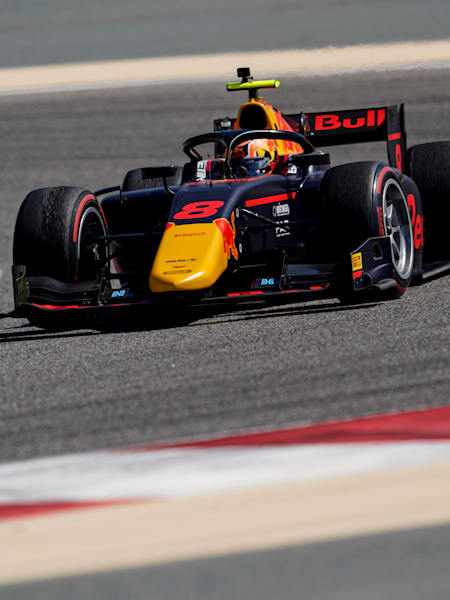Jehan Daruvala was announced as a driver for the Red Bull Junior Team in February 2020, taking him one step closer to fulfilling his F1 dream.
The Red Bull Junior Team has produced the likes of four-time world champion Sebastian Vettel, Max Verstappen, Daniel Ricciardo, and many others. The current drivers of Red Bull Racing and Scuderia AlphaTauri for the 2020 F1 season have all been graduates of the Red Bull Junior Team.
Additionally, India’s only two F1 drivers – Narain Karthikeyan and Karun Chandhok – have been supported by the team in the past. Jehan hopes to follow in their footsteps to become the third Indian in Formula One.
For the 2020 season, he will be racing in F2 with the Carlin team. We caught up with him ahead of the season to discuss his career and how hopefuls could follow his path to a F1 seat.
Here are Jehan Daruvala’s tips for anyone looking to become a professional racer.
Focus on a strong foundation in karting
For someone aspiring to become an F1 driver, it is mandatory to put in five to seven years in competitive karting according to Jehan Daruvala.
“Karting is essential to teach you the race craft required in your single seater,” says Jehan.
“Just because you are one of the best in karting you need not be one of the best in single seaters. However, if you have to be good in single seaters you need to have had a very good karting career,” he adds.
Make an early move to the European circuit
While Jehan feels the Indian karting competitions are great, he says competing in the European circuits is a true indicator of F1 potential.
“In India, you get about 10 to 15 competitors. In Asia, that may go up to 30, while in Europe you very often see grids of 60-plus drivers,” Jehan says, adding that regularly ranking within European karting’s top-10 shows that you have the potential for an F1 seat.
Find a good mentor
Jehan says that having a mentor is important because they can steer you away from the pitfalls that you may unknowingly encounter due to lack of knowledge and experience in motorsport.
“I was fortunate to have Rayomand Banajee support me through my formative years in India and Asia,” says Jehan.
Try to get into the right team
As you move from karting to single seaters, it becomes important to be in the right teams. The single seater structure is such that the junior teams work with the best performing drivers and in turn help them stay on top of the competition; it is a self-fulfilling situation, as Jehan puts it.
“If you make it to a top team, you need to be mentally prepared to have the best drivers as your teammates. This is a very good situation to be in as you get to learn a lot driving in the same team as them, and if you are quicker than your teammates, then you get noticed [by F1 teams] very quickly,” says Jehan.
Secure your career with sponsors
Apart from developing quickly, moving to European competitions can help fund your racing career easier. Since Europe has a long history of motorsports – and F3 and F2 races are broadcast live in most European countries – the chances of getting sponsors are higher once you start racing in Europe.
Work on simulators to sharpen your skills
It might not always be feasible to jump into a single seater when you want to practice. Jehan suggests working on simulators since they help quite a bit – especially if you are trying to learn a new circuit you haven’t raced on before.
“Getting back in a kart also keeps the skills honed and is always fun,” says Jehan.
Stay away from street racing
No professional racer ever endorses street racing because it is dangerous and detrimental to a racing career. Jehan says that street racing is irresponsible and safety is always the most important measure of racing.
“On road driving will never help you go faster on the race track, so there is no point trying to speed on the streets,” says Jehan.
Keep working on your fitness
Jehan says that fitness is very crucial in professional racing. Strength is important to be able to handle the car and endurance is important to help you sustain long periods of time in the car at high speeds at full focus.
“As you progress through the rungs building neck strength is the key as the higher formula cars pull up to 3-4 Gs at high speed,” advises Jehan. Apart from strength training, Jehan does cardio in the form of running, cycling and swimming.
Maintain a strong sense of discipline
Discipline in terms of diet is extremely important for a racecar driver. Jehan says being fit, lean, and mentally sharp help drivers deal with different situations on the track. He says food and nutrition go a long way in helping with mental sharpness.
Be prepared to sacrifice
Jehan says that above everything else, a talented driver needs to be committed to the sport if they want to make it to F1.
"You have to be prepared to be away from family, home and friends, sometimes from a very young age. It’s also important to work on a positive attitude and mental strength as motorsport involves a lot of ups and downs, some which are beyond your control. It thus always helps to take things positively, learn from them and move forward,” says Jehan.



